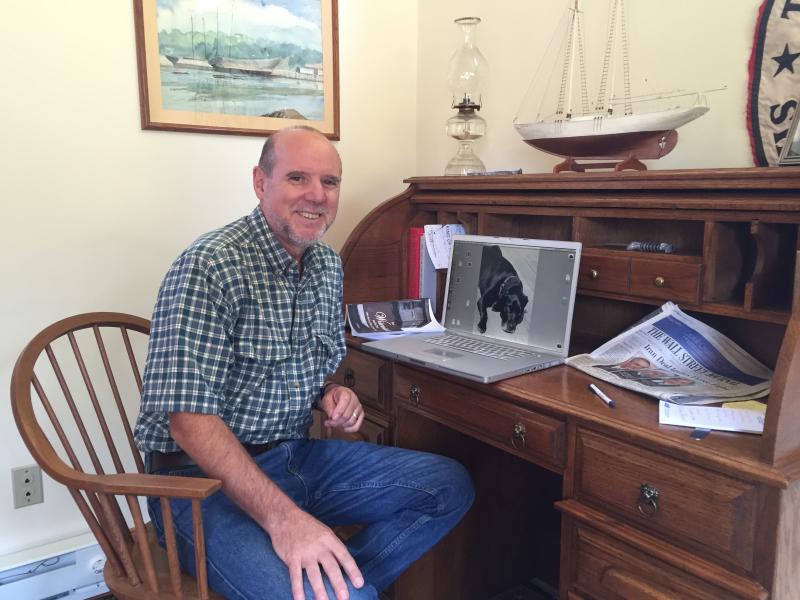Putting the pieces together: Phil Di Vece finds fascination in Wiscasset’s past
Phil Di Vece looks at history as a jigsaw puzzle. And the missing pieces can be the best part.
The search for them can yield a find more interesting than the information he was after, Di Vece said July 16 at his and wife Marjorie’s home on Wiscasset’s Langdon Road. The circa 1900, high-posted cape is where he has written his latest book on the town’s history.
The first one, 2012’s “Wiscasset and Its Times: Stories of Maine’s Prettiest Village,” was already in production when Di Vece wrote a story on 1800s mariner Daniel Collins. “It was really long and it was too late to put it in book one,” he said. So the story started him on the new book, “More Wiscasset and Its Times: Other Stories of Maine’s Prettiest Village.”
With interviews and research of local and state archives, the 59-year-old author-journalist pieces together the past and shares it, story by story.
“Wiscasset has a fascinating history. It really does. And one of the most interesting things for me is how much of the history has survived, if you know where to look for it,” Di Vece said.
Wiscasset Public Library is a great place to do research, along with the Maine State Library, he said.
The New Jersey-raised Di Vece, who published the 1980-1995 newspaper The Wiscasset Times, got the idea for the new book’s “Home Guard” chapter on a local militia unit while he was at the Wiscasset library.
“I was researching something on the Civil War, and I just happened to come across a reference to the Home Guard ... on (an index) card. It said, ‘Home Guard, Fanny Chase, chapter not used.’ So I thought, now that’s interesting. So where’s the unused chapter? And I thought, maybe it’s still here.
“So I dug around some more and I found Fanny Chase’s chapter that never made it in her book (“Wiscasset in Pownalborough”), so this was great ... two typed pages, tucked away in Wiscasset’s public library.”
No subject in Wiscasset’s history has been more misunderstood than the possible meanings of the town’s name, Di Vece said. According to the “Mystic Spellings” chapter in the large-print, self-published second “Wiscasset and Its Times” book, the Rev. Alden Bradford, a local church pastor near the end of the 18th century, believed the name Wiscasset meant waters or rivers meeting. Di Vece attributes another theory to an 1800s scholar of Native American dialects, J. Hammond Trumball. He thought Wiscasset’s name meant the place of yellow pines, a tree not native to New England.
“But before tossing Mr. Trumball’s theory aside consider this,” Di Vece writes. “There are many summer days when the Maine air is so filled with pine pollen that it leaves a fine yellow coating on lakes, ponds and along the riverbank.
“Could it have been the pine pollen the Indians were talking about?”
Or Wiscasset’s name could have a spiritual basis, a theory Di Vece found in an undated and unsigned, handwritten document in Wiscasset Public Library’s archives room. He quotes the anonymous writing as stating that Wiscasset probably refers to “a place where the departed love to linger; and in the mind of an aboriginal, a place of spiritual greetings, home gatherings of the dead in ghostly interchanges ....”
Di Vece goes on to guess that Rufus King Sewall, described in the book as an 1800s historian, clergyman, lawyer and civic leader, may have written the document. He bases the guess in part on Sewall having told about an ancient burial place upriver, on Goose Island.
“He believed the ritualistic burial of the dead there on the island predated the Pilgrims’ arrival by more than two centuries,” DI Vece writes.
Son Jason Di Vece designed both “Wiscasset and Its Times” books. The chapters in each stand on their own, so the reader can start anywhere, Phil Di Vece said.
Di Vece took up writing books about a decade and a half ago with the New Jersey-set fiction work, “King of the Bay.” These days, he contributes news stories to the Wiscasset Newspaper, and isn’t ruling out a third installment of “Wiscasset and Its Times.”
“Well there’s always a possibility, because I enjoy writing these, and people seem to like reading them,” Di Vece said.
“And I think it’s a very positive thing for the town, to have these stories in print. People can learn a little bit about the place where they’re living,” he added.
To buy book two, visit Ames Supply on Bath Road or Amazon.com. Or contact Di Vece at pdivece@roadrunner.com. Each “Wiscasset and Its Times” book can also be checked out from Wiscasset Public Library.
Event Date
Address
United States























